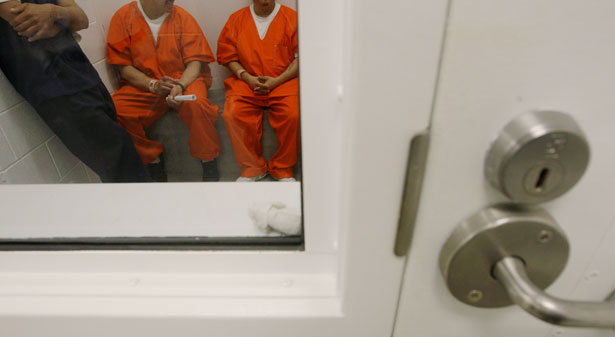
Detainees inside a holding cell at the GEO Group-operated Northwest Detention Center in Tacoma, Washington. (AP Photo/Ted S. Warren)
Now that the federal government is up and running again, President Obama has announced that immigration reform is his highest priority. The country's biggest for-profit prison companies already pull in hundreds of millions of dollars a year locking up immigrants in federal custody. They stand to pull in even more money if the new laws generate lots of new prisoners.
And that, in a nutshell, has always been the private prison business model. Mass incarceration leads to massive profits.
Take the GEO Group. In a country that has more prisoners than any other, this company makes $1.6 billion a year locking people up. GEO secured its market share by hiring an army of 72 lobbyists in 17 states and donating to over 400 candidates between 2003 and 2011. This lobbying paid off in the form of lucrative contracts to run 57 jails and prisons across the US.
Once GEO obtains these contracts, it's hardly a model of corporate responsibility. It has a long record of abuse and neglect at its facilities, including ones that house children. For example, at GEO's youth prison in Walnut Grove, Mississippi, federal officials found that guards engaged in "brazen" sexual abuse of minors, and at GEO's youth prison in Coke County, Texas, state investigators found insect infestations and feces smeared on the walls. At each place, government officials described the facilities as being among the worst they had seen anywhere, and a federal judge described the Walnut Grove youth prison as "a picture of such horror as should be unrealized anywhere in the civilized world."
And yet, GEO is doing quite well, financially. Despite facing myriad lawsuits over the company's abuses, CEO George Zoley makes about $6 million a year.
To keep these profits rolling in and their shareholders happy, GEO has a vested interest in maintaining policies that fuel mass incarceration. Take, for example, sensible drug law reform. In GEO's annual financial filings, the company admitted that it could be "adversely affected" by "any changes with respect to the decriminalization of drugs [that could] potentially reduce demand for correctional facilities." That's because putting fewer people under correctional control would be bad for GEO's bottom line.
Another way GEO stands to profit from our national addition to incarceration? If immigration reform goes badly.
The House Judiciary Committee has passed the SAFE Act (HR 2278), a toxic measure that, if passed, would turn millions of undocumented immigrants into criminals overnight. No longer a civil violation, not having papers would also become a felony punishable by months or years in a US prison. It would also dramatically expand the civil immigration detention system.
Private prison companies could rake in huge profits if this bill becomes law. After all, nearly half of all people in immigration detention are locked in private jails and prisons. This would come at a staggering cost to taxpayers, who would pay private prisons billions of dollars to imprison individuals who are not a public safety risk.
We need to stop Congress from handing a windfall to prison profiteers through this dangerous, profit-hungry legislation. Tell Speaker Boehner: Don't bring the SAFE Act to the House floor.
The GEO Group is just one of the many powerful entities getting rich off mass incarceration. Meet the other Prison Profiteers and take action to fight their abuses at prisonprofiteers.org.


